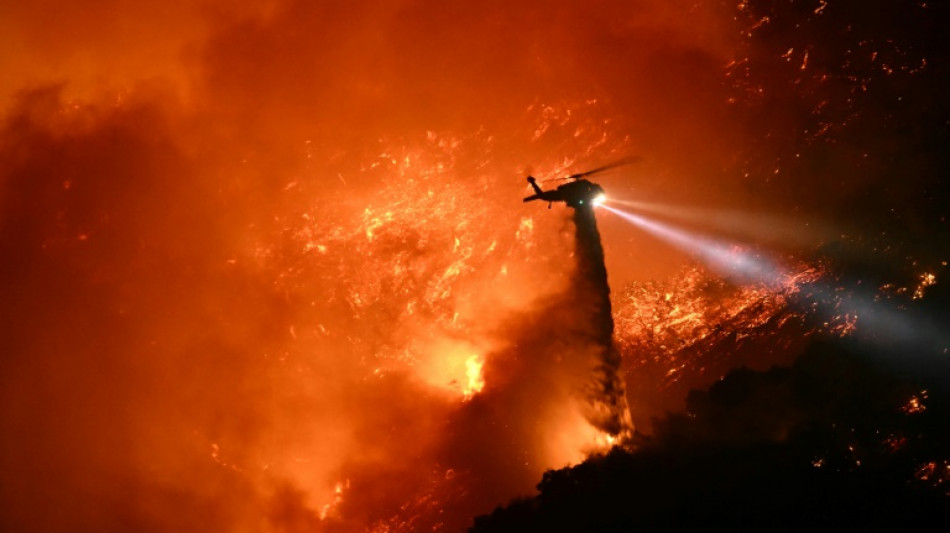
-
 Brazil binman finds newborn baby on garbage route
Brazil binman finds newborn baby on garbage route
-
US senator smashes record with marathon anti-Trump speech

-
 Trump advisor Waltz faces new pressure over Gmail usage
Trump advisor Waltz faces new pressure over Gmail usage
-
Niger junta frees ministers of overthrown government

-
 Trump set to unleash 'Liberation Day' tariffs
Trump set to unleash 'Liberation Day' tariffs
-
Boeing chief to acknowledge 'serious missteps' at US Senate hearing

-
 Real Madrid hold Real Sociedad in eight-goal thriller to reach Copa del Rey final
Real Madrid hold Real Sociedad in eight-goal thriller to reach Copa del Rey final
-
Nuno salutes 'special' Elanga after stunning strike fires Forest

-
 PSG survive scare against Dunkerque to reach French Cup final
PSG survive scare against Dunkerque to reach French Cup final
-
Sundowns edge Esperance as crowd violence mars quarter-final

-
 Nottingham Forest beat Man Utd, Saka scores on Arsenal return
Nottingham Forest beat Man Utd, Saka scores on Arsenal return
-
Elanga wonder-goal sinks Man Utd as Forest eye Champions League berth

-
 Stock markets mostly advance ahead of Trump tariffs deadline
Stock markets mostly advance ahead of Trump tariffs deadline
-
US movie theaters urge 45-day 'baseline' before films hit streaming

-
 Saka scores on return as Arsenal beat Fulham
Saka scores on return as Arsenal beat Fulham
-
Third-division Bielefeld shock holders Leverkusen in German Cup

-
 Ball-blasting 'Torpedo bats' making waves across MLB opening weekend
Ball-blasting 'Torpedo bats' making waves across MLB opening weekend
-
Newsmax shares surge more than 2,000% in days after IPO

-
 Thousands of Hungarians protest against Pride ban law
Thousands of Hungarians protest against Pride ban law
-
GM leads first quarter US auto sales as tariffs loom

-
 Tesla sales tumble in Europe in the first quarter
Tesla sales tumble in Europe in the first quarter
-
No 'eye for an eye' approach to US tariffs: Mexico

-
 NFL club owners back dynamic kickoffs, delay tush push vote
NFL club owners back dynamic kickoffs, delay tush push vote
-
Trump 'perfecting' new tariffs as nervous world braces

-
 Trump nominee says to press UK on Israel arms
Trump nominee says to press UK on Israel arms
-
French court says Le Pen appeal ruling could come before presidential vote

-
 The battle to control assets behind Bosnia crisis
The battle to control assets behind Bosnia crisis
-
Prabhsimran powers Punjab to IPL win over Lucknow

-
 Mass layoffs targeting 10,000 jobs hit US health agencies
Mass layoffs targeting 10,000 jobs hit US health agencies
-
Tiger's April Foolishness: plan to play Masters just a joke

-
 Myanmar quake toll passes 2,700, nation halts to honour victims
Myanmar quake toll passes 2,700, nation halts to honour victims
-
Turkish fans, artists urge Muse to cancel Istanbul gig

-
 US seeks death penalty for accused killer of insurance CEO
US seeks death penalty for accused killer of insurance CEO
-
UK govt moves to block sentencing guidelines for minority defendants

-
 Trump puts world on edge as 'Liberation Day' tariffs loom
Trump puts world on edge as 'Liberation Day' tariffs loom
-
Swedish journalist jailed in Turkey kept 'isolated': employer

-
 Stock markets advance ahead of Trump tariffs deadline
Stock markets advance ahead of Trump tariffs deadline
-
Gulf between Everton and Liverpool has never been bigger, says Moyes

-
 Finland to withdraw from anti-personnel mine ban treaty
Finland to withdraw from anti-personnel mine ban treaty
-
UK vows £20 million to boost drone and 'flying taxi' services

-
 Ford's US auto sales dip in first quarter as tariffs loom
Ford's US auto sales dip in first quarter as tariffs loom
-
Digging for box office gold, 'A Minecraft Movie' hits cinemas

-
 Southampton boss Juric desperate to avoid Premier League 'worst team' tag
Southampton boss Juric desperate to avoid Premier League 'worst team' tag
-
Thailand rescue dogs double as emotional support

-
 Five takeaways from Marine Le Pen verdict
Five takeaways from Marine Le Pen verdict
-
Stock markets split ahead of Trump tariffs deadline

-
 Turkish fans, artists urge Muse to cancel Istanbul gig over protest dispute
Turkish fans, artists urge Muse to cancel Istanbul gig over protest dispute
-
Former captain Edwards named new England women's cricket coach

-
 Haaland ruled out for up to seven weeks: Man City boss Guardiola
Haaland ruled out for up to seven weeks: Man City boss Guardiola
-
UK Supreme Court opens car loans hearing as banks risk huge bill


January smashes heat record, surprising scientists
Last month was the hottest January on record, blitzing the previous high and stunning climate scientists who expected cooler La Nina conditions to finally start quelling a long-running heat streak.
The Copernicus Climate Change Service said January was 1.75C hotter than pre-industrial times, extending a persistent run of historic highs over 2023 and 2024, as human-caused greenhouse gas emissions heat the planet.
Climate scientists had expected this exceptional spell to subside after a warming El Nino event peaked in January 2024 and conditions gradually shifted to a cooling La Nina phase.
But the heat has lingered at record or near-record levels ever since, sparking debate among scientists about what other factors could be driving warming to the top end of expectations.
Scientists warn that every fraction of a degree of warming increases the intensity and frequency of extreme weather events like heatwaves, heavy rainfall and droughts.
January was 0.09C hotter than the previous high of January 2024 -- a "sizeable margin" in global temperature terms, said Julien Nicolas, a climate scientist from Copernicus.
"This is what makes it a bit of a surprise... you're not seeing this cooling effect, or temporary brake at least, on the global temperature that we were expecting to see," he told AFP.
Stefan Rahmstorf, from the University of Potsdam, said it was the first time that temperatures recorded during a La Nina period were above those of a preceding El Nino.
"This is of serious concern -- over the past sixty years, all twenty five La Nina January's have been cooler than surrounding years," he said.
- Weak La Nina -
This year La Nina is expected to be weak and Copernicus said prevailing temperatures in parts of the equatorial Pacific Ocean suggested "a slowing or stalling of the move towards" the cooling phenomenon.
Nicolas said it could disappear completely by March.
Last month, Copernicus said that global temperatures averaged across 2023 and 2024 had exceeded 1.5 degrees Celsius for the first time.
This did not constitute a permanent breach of the long-term 1.5C warming target under the Paris climate accord -- but was a clear sign that the limit was being tested.
Overall, 2025 is not expected to follow 2023 and 2024 into the history books: scientists predict it will rank as the third hottest year yet.
Copernicus said it would be closely monitoring ocean temperatures throughout 2025 for hints about how the climate might behave.
Oceans are a vital climate regulator and carbon sink, and cooler waters can absorb greater amounts of heat from the atmosphere, helping to lower air temperatures.
They also store 90 percent of the excess heat trapped by humanity's release of greenhouse gases.
"This heat is bound to resurface periodically," said Nicolas.
"I think that's also one of the questions -- is this what has been happening over the past couple of years?"
Sea surface temperatures have been exceptionally warm over 2023 and 2024, and Copernicus said readings in January were the second highest on record.
"That is the thing that is a little puzzling -- why they remain so warm," Nicolas said.
- Open questions -
Bill McGuire, a climate scientist from University College London, said it was "astonishing and frankly terrifying" that January remained at record highs despite La Nina emerging.
Joel Hirschi, from the UK's National Oceanography Centre, cautioned against reading too much into a single month's data, saying record warmth had been observed following El Nino phases even after the onset of La Nina.
Scientists are unanimous that burning fossil fuels has largely driven long-term global warming, and that natural climate variability can also influence temperatures from one year to the next.
But natural warming cycles like El Nino could not alone explain what had taken place in the atmosphere and seas, and answers were being sought elsewhere.
One theory is that a global shift to cleaner shipping fuels in 2020 accelerated warming by reducing sulphur emissions that make clouds more mirror-like and reflective of sunlight.
In December, a peer-reviewed paper looked at whether a reduction in low-lying clouds had let more heat reach Earth's surface.
"These are avenues that must be taken seriously, and remain open," Robert Vautard, a leading scientist with the UN's climate expert panel IPCC, told AFP.
The EU monitor uses billions of measurements from satellites, ships, aircraft and weather stations to aid its climate calculations.
Its records go back to 1940, but other sources of climate data -- such as ice cores, tree rings and coral skeletons -- allow scientists to expand their conclusions using evidence from much further in the past.
Scientists say the current period is likely the warmest the Earth has been for the last 125,000 years.
M.Thompson--AMWN



